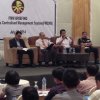PETALING JAYA: The cost of medical check-ups for foreign workers under the postponed Foreign Workers Centralised Management System (FWCMS) has increased because clinics have to conduct more thorough checks, claims Bestinet Sdn Bhd.
The company, which developed the controversial system, said many foreign workers at source countries, including Indonesia and the Philippines, had previously been conducting only partial checks at clinics there in order to cut costs.
Bestinet executive director Rathakrishnan Vellaisamy said this had caused foreign workers to bring various diseases, such as tuberculosis, into Malaysia.
“When FWCMS was implemented, all the medical centres were registered with the system.
“Imagine if they conducted incomplete checks, we would know exactly which clinics were responsible,” he said.
He said the cost of medical checks in source countries had shot up following the implementation of FWCMS because the clinics had to charge more for complete check-ups.
On Jan 30, the Immigration Department announced that the implementation of the FWCMS was postponed with immediate effect.
Its deputy director-general Datuk Sakib Kusmi said the postponement would enable the department and the Home Ministry to consider policies and review feedback from various parties, especially employers.
This followed protests from business groups, which claimed that the FWCMS made it more difficult and costly to bring in foreign workers.
“Previously, agents would demand for clinics to give them ‘a cut’ from their medical fees.
“If the clinic refused to do so, the agents would take their workers elsewhere for their check-ups,” said Rathakrishnan.
He also claimed that FWCMS had actually made the intake of foreign workers more efficient as the process that had previously taken weeks or months to complete could be done in a few days.
Asked about allegations that the company was charging medical centres exorbitant fees just to be part of the FWCMS’ approved clinics, Rathakrishan said the clinics needed to buy biometric machines and other technical equipment needed to ensure the security of the data.
Source: The Star
Bestinet: Costlier Medical Checks Due To More Thorough Screening

